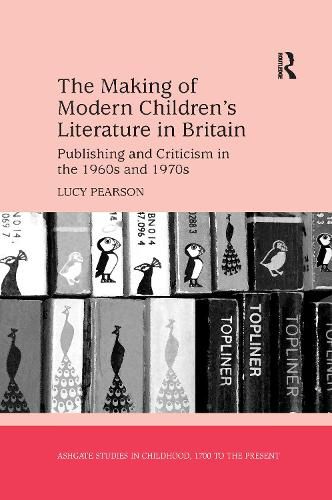Readings Newsletter
Become a Readings Member to make your shopping experience even easier.
Sign in or sign up for free!
You’re not far away from qualifying for FREE standard shipping within Australia
You’ve qualified for FREE standard shipping within Australia
The cart is loading…






Lucy Pearson’s lively and engaging book examines British children’s literature during the period widely regarded as a ‘second golden age’. Drawing extensively on archival material, Pearson investigates the practical and ideological factors that shaped ideas of ‘good’ children’s literature in Britain, with particular attention to children’s book publishing. Pearson begins with a critical overview of the discourse surrounding children’s literature during the 1960s and 1970s, summarizing the main critical debates in the context of the broader social conversation that took place around children and childhood. The contributions of publishing houses, large and small, to changing ideas about children’s literature become apparent as Pearson explores the careers of two enormously influential children’s editors: Kaye Webb of Puffin Books and Aidan Chambers of Topliner Macmillan. Brilliant as an innovator of highly successful marketing strategies, Webb played a key role in defining what were, in her words, ‘the best in children’s books’, while Chambers’ work as an editor and critic illustrates the pioneering nature of children’s publishing during this period. Pearson shows that social investment was a central factor in the formation of this golden age, and identifies its legacies in the modern publishing industry, both positive and negative.
$9.00 standard shipping within Australia
FREE standard shipping within Australia for orders over $100.00
Express & International shipping calculated at checkout
Lucy Pearson’s lively and engaging book examines British children’s literature during the period widely regarded as a ‘second golden age’. Drawing extensively on archival material, Pearson investigates the practical and ideological factors that shaped ideas of ‘good’ children’s literature in Britain, with particular attention to children’s book publishing. Pearson begins with a critical overview of the discourse surrounding children’s literature during the 1960s and 1970s, summarizing the main critical debates in the context of the broader social conversation that took place around children and childhood. The contributions of publishing houses, large and small, to changing ideas about children’s literature become apparent as Pearson explores the careers of two enormously influential children’s editors: Kaye Webb of Puffin Books and Aidan Chambers of Topliner Macmillan. Brilliant as an innovator of highly successful marketing strategies, Webb played a key role in defining what were, in her words, ‘the best in children’s books’, while Chambers’ work as an editor and critic illustrates the pioneering nature of children’s publishing during this period. Pearson shows that social investment was a central factor in the formation of this golden age, and identifies its legacies in the modern publishing industry, both positive and negative.